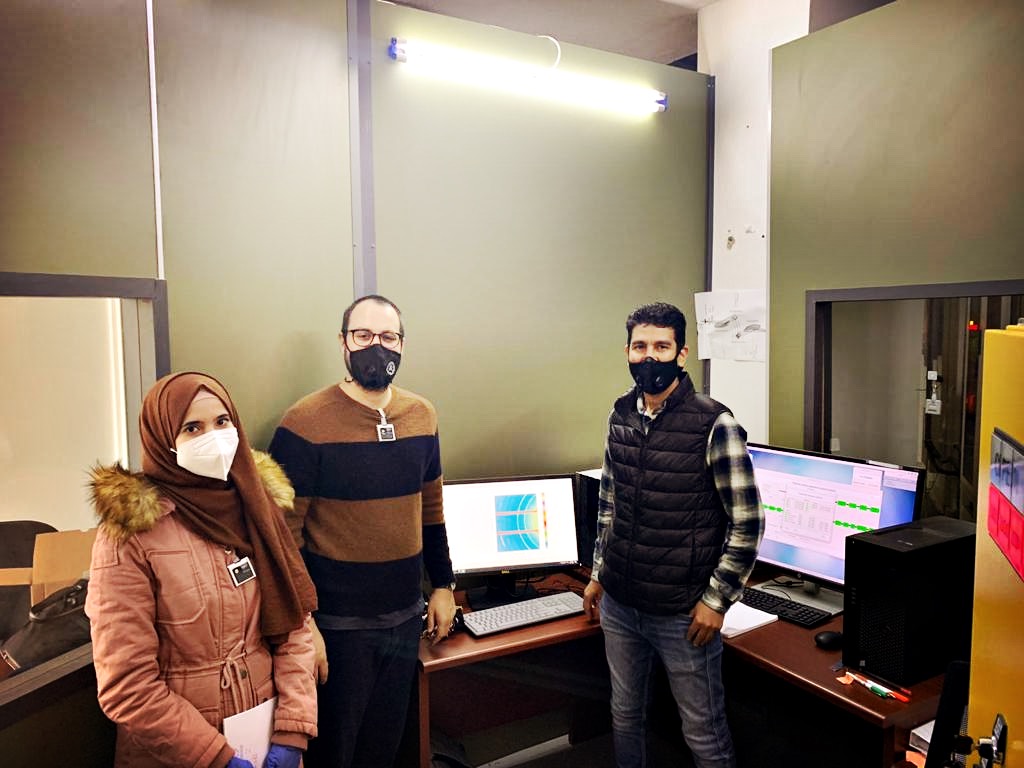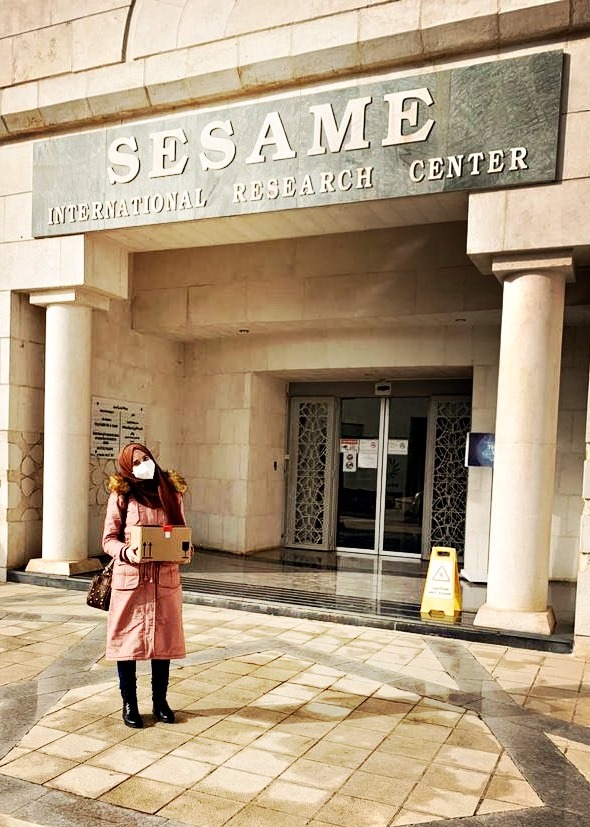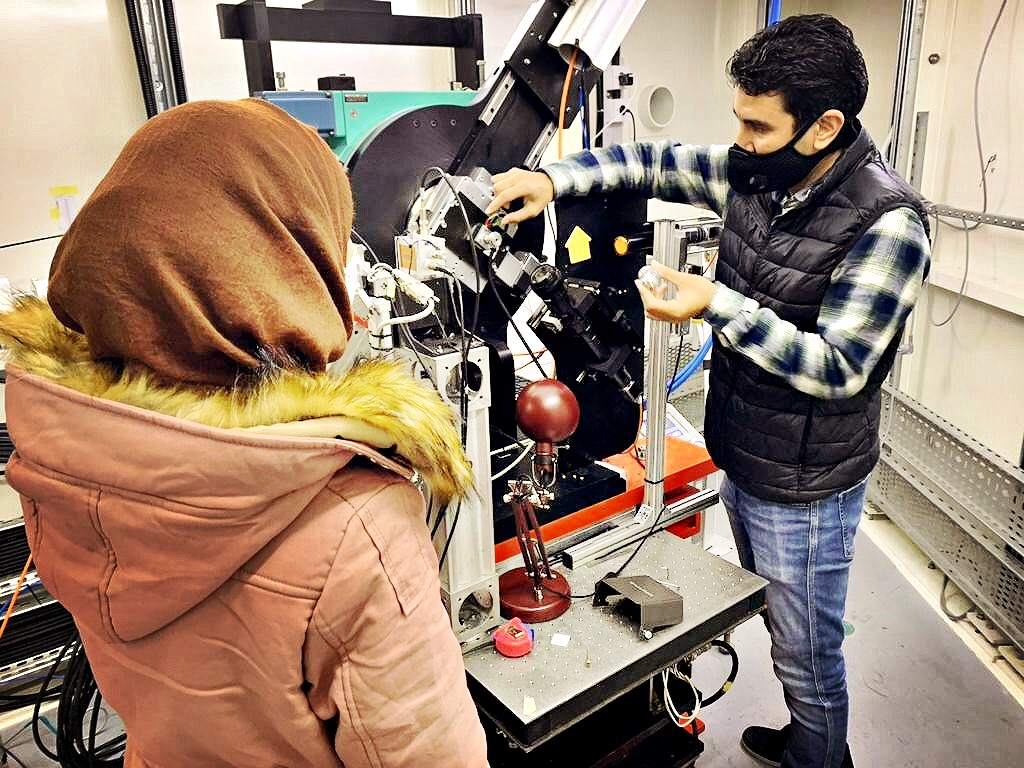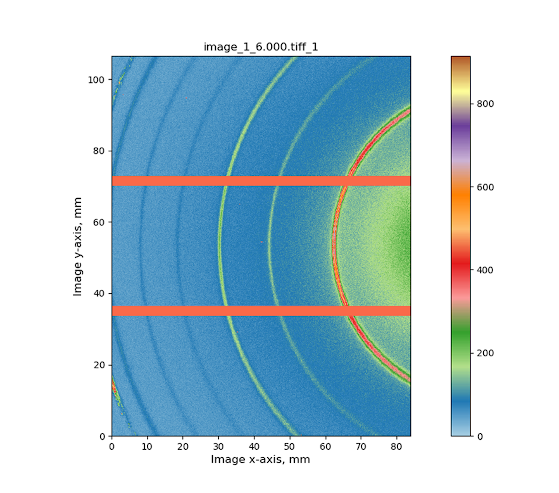
Allan, Jordan, 22 December 2020.
On 17 December, SESAME opened the doors of its Materials Science (MS) beamline to a team from the Royal Scientific Society (RSS) in Jordan, making this instrument, which is dedicated to structural studies with X-ray powder diffraction, the third of the Centre’s beamlines to be fully operational and hosting users.
"We are looking at the first diffraction pattern ever measured for a user sample on the newly-commissioned MS beamline at SESAME. RSS has a place in the history of SESAME”, said HRH Princess Sumaya bint El Hassan, President of the RSS.
The RSS team consists of Kyle Cordova, Executive Director of Scientific Research and Assistant for Research and Development to HRH Princess Sumaya bint El Hassan, and his colleague, the Junior Staff Scientist Ala’a Al-Ghourani. “Our research is focused on discovering new, highly-porous materials for use in mitigating the effects of climate change. Understanding our material’s structure at the atomic level is critical for ensuring that the target application can be met. SESAME’s MS beamline allows us to do this – through X-ray diffraction we can solve the chemical structure in order to improve our material’s end performance” indicated Kyle Cordova, adding “Being the first users is an immense honour. I am proud to be representing Jordan’s largest applied research institution, the Royal Scientific Society, in this historic first!”

In the words of Khaled Toukan, Director of SESAME, “to now also have the MS beamline on stream constitutes an important scientific milestone and I congratulate the SESAME staff on this achievement. We look forward to welcoming the new community of MS users that will further contribute to the success of the Facility, which, after only two years since the first experiment, may already boast of 13 peer reviewed papers.”
The former and present Scientific Directors of SESAME, Giorgio Paolucci and Andrea Lausi, who, respectively, oversaw the construction and commissioning phases, joined voices in stating “such an important and demanding mission, initiated thanks to the donation of beamline components previously located at the Swiss Light Source, has been accomplished against all odds in this difficult year. This is an extremely satisfactory measure of the capacity and dedication of all SESAME staff, and in particular of the principal beamline scientist Mahmoud Abdellatief. We look forward to the many scientific fruits SESAME’s synchrotron radiation powder diffraction beamline will bring to the region and beyond.”
A true “swiss-army knife” in X-ray structural techniques, the MS powder diffraction capabilities can be used on a large variety of samples to extract information on many relevant parameters, from first identification of the components, to the position of atoms in its structure, to microstructural properties such as deformations under stress and texture. Powder diffraction is critical for studies in geology, environmental science, materials science, engineering, cultural heritage, and biology.
“Today is a historical day for the MS beamline, as it moves from a beamline being constructed to one that hosts its first users”, said Mahmoud Abdellatief, the MS principal beamline scientist, “It is a very emotional and exciting moment for me, and there can be no better way to close 2020, which has been so difficult a year for humanity as a whole”. The users from the RSS will shortly be followed by others since during the commissioning phase already, 24 proposals (from Egypt, Iran, Italy, Jordan, Pakistan, Palestine and Turkey) were received, of which 13 have been positively evaluated by SESAME’s international peer-review committee.

“With several of our research institutions represented at the global top in both particle physics and materials science” said H.E. Lukas Gasser, Ambassador of Switzerland to the Hashemite Kingdom of Jordan, “Switzerland is particularly proud to be an observer country of SESAME. This laboratory is a good example of the Swiss Government’s vision of “science for diplomacy”. We believe that science has no borders and can actually overcome barriers between nations, which is exactly what SESAME does. Therefore, it is with enthusiasm that we witness SESAME's materials science beamline coming online and the Royal Scientific Society of Jordan being the first user. This important step is also a source of pride for us, because the materials science beamline is the “Swiss beamline” at SESAME: the Swiss Paul Scherrer Institute and one of its spin-off companies, Dectris, were key contributors to the beamline‘s realisation, by providing training and donating key components, such as the PILATUS3 300K detector”.
Rolf Heuer, the President of the SESAME Council, congratulated SESAME while pointing out that “Switzerland’s donation to SESAME is yet another example of the engagement of the Observers and testimony to the important role being played by them in the development of this international Facility”.


